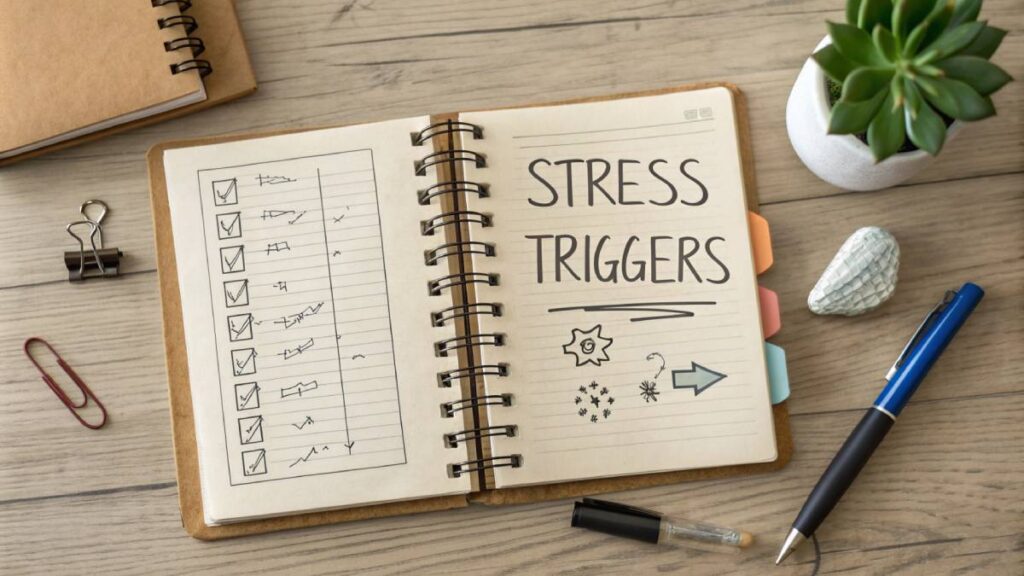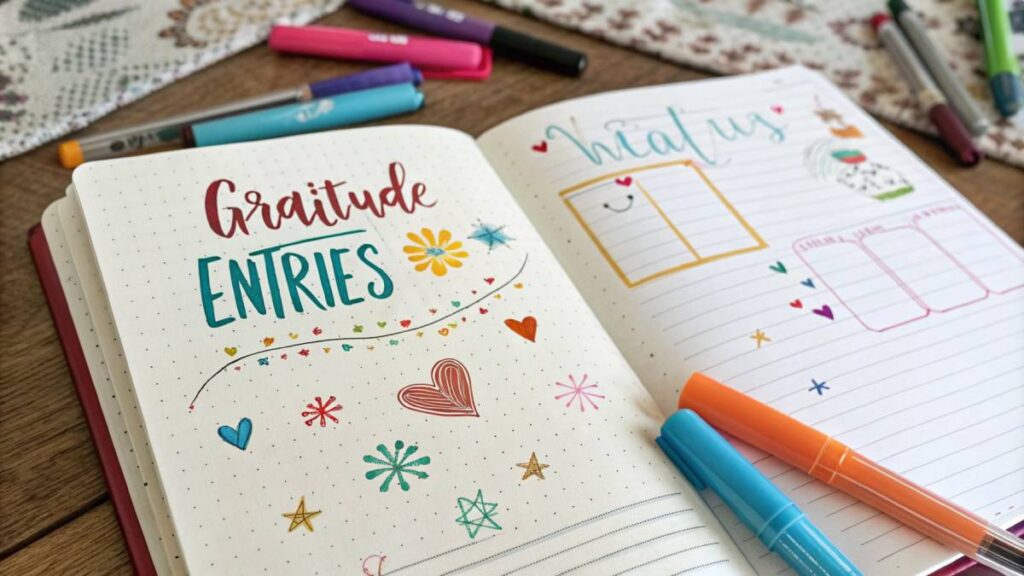Imagine having a trusted confidant who listens without judgment, helps you untangle life’s chaos, and offers clarity—all without saying a word. That’s the magic of journaling. Whether you’re feeling frazzled by looming deadlines or overwhelmed by daily demands, putting pen to paper is like hitting a mental refresh button. Beyond being an outlet for bottled-up emotions, journaling is a proven stress-relief tool that can transform how you cope, grow, and thrive.
Key Takeaways
- Journaling helps release pent-up emotions, offering immediate stress relief.
- It provides clarity by organizing tangled thoughts and uncovering stress triggers.
- Writing promotes self-awareness, problem-solving, and emotional growth.
- Reflective prompts guide mindfulness, enabling effective stress management.
- Journaling can be paired with self-care and mindfulness practices for maximum impact.
The Healing Power of Journaling
Benefits of Journaling for Stress Relief
Journaling acts like a good friend who’s ready to listen without interrupting, which can make your stress take a hike. Scribbling your thoughts and feelings can lead to a treasure chest of benefits. Check out what writing can do for you when life gets a bit too hectic:
| Benefit | Why It Rocks |
|---|---|
| Letting It All Out | You get to pour out those bottled-up feelings, which can ease that tight knot in your stomach. |
| Seeing Things Clearly | Jotting things down helps you untangle messy thoughts and see what’s stressing you out in a new light. |
| Cracking Problems | Writing about problems can spark new ideas and help you figure out solutions. |
| Calming Effect | Putting pen to paper can chill you out, bringing those stress levels way down. |
| Looking Inward | Journaling nudges you to take a good look at yourself and grow along the way. |
And there’s more to it! Studies say regular journaling can even tone down physical stress symptoms like headaches or stiff muscles. Dive deeper with our piece on physical symptoms of stress.

Introduction to Reflective Stress Journal Prompts
Reflective stress journal prompts? They’re like training wheels for your brain, helping you dig deep into what’s bothering you. These handy prompts guide you on a quest to explore your inner world and find ways to cope. By mulling over specific prompts, you step into the realm of self-reflection and gain a sneak peek into your mental health.
These prompts don’t just spotlight stressors; they kickstart your brainstorming on how to handle them. They’re a game-changer for folks planning a solid stress management plan. Turning your scribbles into a mindful exercise steers casual journaling toward personal growth and understanding.
Along this trip, you might stumble on related practices like chilling out with mindfulness exercises or taming nerves with breathing techniques. Giving breathing exercises for stress a whirl before journaling can sharpen your focus and supercharge your session. Reflective journaling loads you up with valuable tools to handle life’s wild ups and downs, moving you towards a healthier mindset.

Getting Started
Jumping into journaling to tackle stress is like putting your feet up after a long day—it’s all about creating a vibe where you can truly relax. This section spills the beans on setting up the perfect space for those personal reflections and throws in some handy journaling tips on top.
“Writing about emotional experiences creates a space to process and make sense of them.” — James Pennebaker, Psychologist
Setting the Mood for Reflection
The right ambiance sets the stage for a journaling session that feels like a warm hug. Here’s how you can get that cozy setup just right:
| Thing to Tweak | What to Do |
|---|---|
| Lighting | Go for soft, yellowy light or get those candles burning for extra chill vibes. |
| Space | Pick a quiet corner where your mind can wander without interruptions. |
| Comfort | Add some fluffy blankets or plump cushions to make your nest snuggly. |
| Smells | Bust out those essential oils or light up a fragrant candle—think lavender or chamomile for max relaxation. |
| Sound | Cue up some mellow tunes or nature sounds to wash over you and wash away stress. |
Tips for Rocking Your Journal
To really milk journaling for all its worth, slap some strategy on it. Here are some no-nonsense tips to get the most bang for your buck:
| Tip | What’s the Deal? |
|---|---|
| Be Real | Let the words flow like no one’s reading. It peels back the layers to what’s really poking at you. |
| Get Scheduled | Block out time each day or week and let it become your thing. |
| Shut it Down | Switch off the noise—phones, alerts, you name it—to dive deep with zero interruptions. |
| Prompt Party | Use stress journal prompts to kickstart your thoughts and dig into stress from all angles. |
| Keep it Chill | Forget trying to craft Pulitzer-worthy entries. Quick and simple is just as therapeutic. |
| Track the Journey | Peek back at old entries now and then—you might spot patterns or see how far you’ve come. |
| Shake Things Up | Dabble with different formats—bullets, sketches, whatever keeps it fresh and you coming back for more. |
By pairing a serene setup with solid journaling tricks, you’ll be rolling with the therapeutic punches of reflection in no time. Just give it a whirl and you’ll find yourself grappling with stress in a more laid-back, head-cleared kind of way. For more stress-busting goodies, check out our stress management plan.
Reflective Stress Journal Prompts
Writing stuff down ain’t just a thing of the past—it’s a nifty trick to chill out and get to know yourself a little better. Get a load of these stress journal prompts that’ll help folks piece together their haywire thoughts and emotions, paving a smoother road to feeling better and growing stronger.
“Journaling cultivates mindfulness, helping you stay present while reducing anxiety and stress.” — Dr. Aria Campbell-Danesh, Behavioral Change Psychologist
Prompt 1: Acknowledging Your Stress Triggers
Before you can tackle it, you’ve gotta know what’s got your heart pounding like a drum. So, start your scribbling by jotting down all the stuff, scenes, or folks that drive you up the wall. Spotting these stress beacons can gear you up to face ’em head-on.
| Stress Trigger | Frequency | Reaction |
|---|---|---|
| Work Deadlines | Often | Anxious |
| Family Conflicts | Sometimes | Overwhelmed |
| Social Gatherings | Rarely | Nervous |
Prompt 2: Expressing Your Emotions Freely
Let those feelings out! When life’s got you feeling like a canned soda, write it all down without holding back or worrying about what it sounds like or what others might think. Nobody’s judging here, so pour it all out!

Prompt 3: Identifying Positive Coping Strategies
When the going gets tough, the tough get coping! Think back on what pulls you out of a funk and list those lifesavers. Could be as simple as a brisk walk or a little belly laugh with pals.
| Coping Strategy | Effectiveness (1-10) | Notes |
|---|---|---|
| Exercise | 9 | Lifts spirits |
| Deep Breathing | 8 | Calms nerves |
| Chatting with Pals | 7 | Shares the load |
Prompt 4: Reflecting on Self-Care Practices
Looking after number one is where it’s at! How’s your self-care routine? Look into the ways you pamper yourself and consider how they keep stress at bay.
| Self-Care Activity | Frequency | Impact on Stress |
|---|---|---|
| Reading | Thrice a week | Soothing |
| Strolling | Every day | Revitalizing |
| Spa Days | Once a month | Refreshing |
Prompt 5: Setting Realistic Goals for Stress Management
A little goal-setting never hurt anybody! Map out one to three doable, clear-cut goals that’ll help you tell stress where to go.
| Goal | Target Date | Progress |
|---|---|---|
| Attend stress workshop | Two months | Yet to start |
| Meditate daily | One month | Getting there |
| Cut down on overtime | Ongoing | Success! |
Prompt 6: Practicing Gratitude for Everyday Moments
Counting your blessings can turn the volume down on your woes. List three little nuggets of gratitude each day, and soon enough, you’ll unearth more things to smile about.
| Date | Gratitude List |
|---|---|
| Day 1 | 1. Kind text from a friend 2. Sunny skies 3. Finishing a great book |
| Day 2 | 1. Tasty breakfast 2. Nature walk 3. Family laugh-fest |
Prompt 7: Imagining Your Ideal State of Calmness
Picture the calm after the storm. What’s your slice of peace look like? Get your imagination cooking and paint a mental picture of pure chill vibes.

Prompt 8: Visualizing a Stress-Free Future
Think of a world where you got this stress thing pegged. Write about this utopia and scribble a few ideas to make your dream reality.
These prompts are like having a chat with your brain over tea, nudging you to dig deeper into that thing called stress. Get comfy with regular journaling, and soon, you’ll be on your way to tackling those pesky stress gremlins. For more chill tips, slide on over to our stress management plan.

Conclusion
Journaling isn’t just writing—it’s a pathway to understanding yourself, managing stress, and finding balance. By identifying stressors, reflecting on emotions, and setting intentional goals, you can turn chaotic thoughts into actionable insights. The beauty of journaling lies in its simplicity: with just a notebook and a quiet space, you can unlock a more peaceful, focused, and resilient you. So, grab that pen—your stress-free future awaits.
FAQs
What are the benefits of journaling for stress relief?
Journaling helps reduce stress by releasing emotions, offering clarity, and fostering self-reflection, leading to better coping and emotional well-being.
How do reflective stress prompts work?
Reflective prompts guide you to explore stress triggers, emotions, and coping strategies, enabling deeper self-awareness and effective stress management.
Can journaling improve physical stress symptoms?
Yes! Studies show journaling can reduce physical stress symptoms like headaches, tension, and fatigue by calming the mind and improving emotional regulation.
What’s the best way to start a journaling practice?
Start by setting a relaxed atmosphere, using reflective prompts, and writing without judgment. Consistency and honesty are key to reaping benefits.
What tools do I need for effective journaling?
All you need is a notebook, a pen, and a quiet, comfortable space. Optional tools include prompts, calming music, or aromatherapy for a cozy atmosphere.








